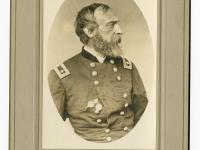Answer: General Robert E. Lee, retreating back to Virginia after his army's defeat at the Battle of Gettysburg, July 1-3, 1863.
In honor of Father’s Day, a famous Philadelphia father-and-son duo.
Alexander James Dallas was born in Kingston, Jamaica (1759). He grew up primarily in the United Kingdom after his father, a successful Scottish physician, sent him as a child to Edinburgh and Westminster for his education. While in Britain studying law, Dallas made the acquaintance of English writer Dr Johnson and Benjamin Franklin.
In his early twenties Dallas married Arabella Maria Smith and settled in the West Indies before immigrating to Philadelphia (1783). Two years later, Dallas was admitted to practice law in the courts of the Unites States and went on to become a successful lawyer.
In 1791, Thomas Mifflin, Pennsylvania governor, appointed Dallas as the secretary of Pennsylvania. He later served a term as secretary of the treasury (1814-1816) under President James Madison, during a brief period of which he was named acting secretary of war. Dallas resigned from federal work in the mid 1810s and resumed his legal practice in Philadelphia.
George Mifflin Dallas, one of Alexander's sons, also made a name for himself in Philadelphia. Born in 1792 as the second of six children of Alexander and Arabella Dallas, George studied law at the College of New Jersey (now Princeton University) and graduated in 1810. George, however, did not possess a great enthusiasm for practicing law and instead sought out military service during the War of 1812, but his father’s objections forced him to abandon this plan.
In 1813 George accepted a position serving as a private assistant to the Secretary of the Treasury, Albert Gallatin. He accompanied Gallatin on peace missions to Russia, England, and Belgium. In 1815, he began a stint as a solicitor for the Second Bank of the United States and one year later married into the affluent Chew family via Sophia Chew Nicklin, with whom he would eventually have 8 children.
When Alexander returned to his law firm in late in life, he and his son George had intended to practice together, but the union never materialized. Only three months after he had resumed legal work, Alexander died in January 1817. George went on to have a successful political career that included tenures as mayor of Philadelphia (1828-1829), attorney general of Pennsylvania (1833-1835), and United States vice-president under James K. Polk (1845-1849). In 1837 he was appointed to serve as the minister to Russia where he and his family resided for two years. George died in Philadelphia in December 1864.
The George G. Meade Collection (#410) covers all aspects of Meade's career, including his student work, his work as a cartographer while working for the U.S. coastal survey and during the Civil War, and his service as commander of the Army of the Potomac. In addition to his military papers, there are a significant group of letters to Meade's wife Margaretta and their children, which document his family relationships and his feelings about his military service during the Mexican-American and Civil wars.

